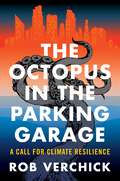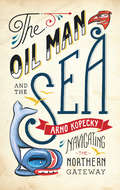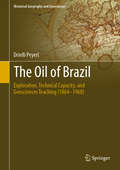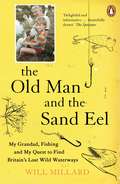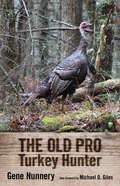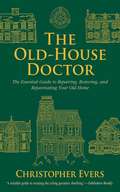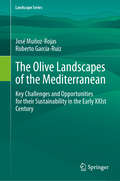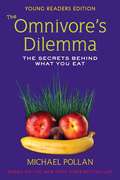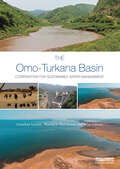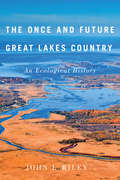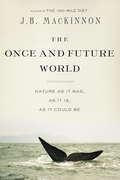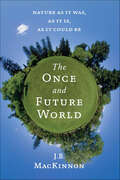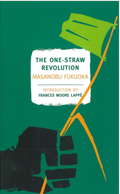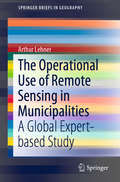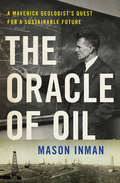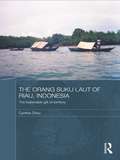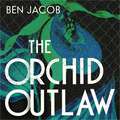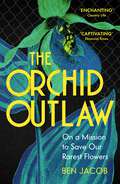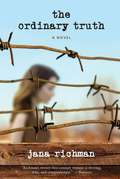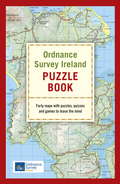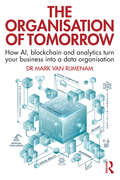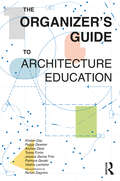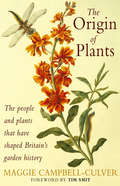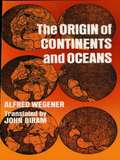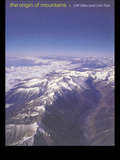- Table View
- List View
The Octopus in the Parking Garage: A Call for Climate Resilience
by Rob VerchickOne morning in Miami Beach, an unexpected guest showed up in a luxury condominium complex’s parking garage: an octopus. The image quickly went viral. But the octopus—and the combination of infrastructure quirks and climate impacts that left it stranded—is more than a funny meme. It’s a potent symbol of the disruptions that a changing climate has already brought to our doorsteps and the ways we will have to adjust.Rob Verchick examines how we can manage the risks that we can no longer avoid, laying out our options as we face climate breakdown. Although reducing carbon dioxide emissions is essential, we need to adapt to address the damage we have already caused. Verchick explores what resilience looks like on the ground, from early humans on the savannas to today’s shop owners and city planners. He takes the reader on a journey into the field: paddling through Louisiana’s bayous, hiking in one of the last refuges of Joshua trees in the Mojave Desert, and diving off Key Largo with citizen scientists working to restore coral reefs. The book emphasizes disadvantaged communities, which bear the brunt of environmental risk, arguing that building climate resilience is a necessary step toward justice.Engaging and accessible for nonexpert concerned citizens, The Octopus in the Parking Garage empowers readers to face the climate crisis and shows what we can do to adapt and thrive.
The Oil Man and the Sea: Navigating the Northern Gateway
by Arno KopeckyA sailing trip along the proposed Northern Gateway marine route with a fresh new voice in non-fiction.With oil and gas behemoth Enbridge Inc.'s Northern Gateway proposal nearing approval, supertankers loaded with two million barrels of oil may soon be plying the waters from northern British Columbia down the wild Pacific Coast. <P><P>This region is home to the largest tract of temperate rainforest on earth, First Nations who have lived there for millennia, and some of the world's most biodiverse waters-one spill is all it will take to erase ten thousand years of evolution.Arno Kopecky and his companions travel aboard a forty-one-foot sailboat exploring the pristine route-a profoundly volatile marine environment that registered 1,275 marine vessel incidents-mechanical failures, collisions, explosions, groundings, and sinkings-between 1999 and 2009 alone. Neither Kopecky nor the boat's owner have ever sailed before, yet they brave these waters alone when their captain leaves them part way through the journey.Written with Kopecky's quick humor and deft touch, this is a rich evocation of a mythic place and the ecology, culture, and history of a legendary region with a knife at its throat.
The Oil of Brazil: Exploration, Technical Capacity, and Geosciences Teaching (1864-1968) (Historical Geography and Geosciences)
by Drielli PeyerlThis book investigates the role of the National Petroleum Council (CNP) and especially of Petrobras in the construction and shaping of courses in Geosciences, as part of the historical process of the search for and exploration of oil, which began in Brazil in 1864 and ended in 1968 with the discovery of the first offshore well.The book explores the history of the discovery of oil in Brazil together with the historical development of oil research and geosciences in Brazil. It also elucidates significant events and developments which occurred between 1864 and 1968 such as the foundation of the Ouro Preto Mining School, the foundation of the CNP and Petrobras and other scientific societies and universities and their contributions to the formation and constitution of geosciences in Brazil. This book also discusses the massive investments by CNP and Petrobras in technical and scientific research for oil exploration in the Brazilian territory.This unique book appeals to scientists, students and professionals in geosciences, history and related fields.
The Old Man and the Sand Eel
by Will Millard'A wonderfully fluent account of how the strange magic of water and the beings that inhabit it can enchant and intoxicate' Chris YatesGrowing up on the Cambridgeshire Fens, Will Millard never felt more at home than when he was out with his granddad on the riverbank, whiling away the day catching fish. As he grew older his competitive urge to catch more and bigger fish led him away from that natural connection between him, his grandfather and the rivers of his home. That is, until the fateful day he let a record-breaking sand eel slip through his fingers and he knew that he had lost the magic of those days down by the river, and that something had to change. The Old Man and the Sand Eel is at its heart the story of three generations of men trying to figure out what it is to be a man, a father and a fisherman. It plots Will's scaly stepping stones back to his childhood innocence, when anything was possible and the wild was everywhere.***'[Will Millard] is a master wordsmith and his first book is a joyful testament to that' Isabelle Broom, Heat'[Will Millard] writes with a genuine sense of humility (...) humour and reflection' Kevin Parr, Countryfile 'Delightful and informative (...) beautifully drawn (...)The Old Man and The Sand Eel will be enjoyed by anyone who loves the challenge and mystery of baiting a hook and plopping it into the water' Spectator'This is post-modern nature writing that embraces beauty where it finds it and marvels at nature's tenacity (...) But there's more here than just fish. This is also a book about growing up, about how to retain a connection with those who raised you while forging your own identity - what to keep and what to discard. And it's about men. The strong surges of emotion that both draw them together and keep them apart, and the shared pastimes which recognise that intimacy and meaning aren't always accompanied by words' Olivia Edward, Geographical
The Old Pro Turkey Hunter
by Gene NunneryDuring his life, Gene Nunnery was recognized as a master turkey hunter and an artisan who crafted unique, almost irresistible turkey calls. In The Old Pro Turkey Hunter, the vaunted sportsman shares over fifty years of personal experience in Mississippi and surrounding states, along with the decades-old wisdom of the huntsmen who taught him. Throughout the book, his stories make clear that turkey hunting is more than just killing the bird—it is about matching wits with a wild and savvy adversary. As Nunnery explains, “To me that’s what it’s all about: finding a wise old gobbler who will test your skill as a turkey hunter.” Through his stories, Nunnery reveals that the true reward for successful turkey hunting lies in winning the contest, not necessarily exterminating the foe. Real sportsmen know that every now and then the turkey should and will elude the hunter. As Nunnery looks back on his extensive career, he analyzes vast differences in practice, old and new. The shift, he decides, came during his last twenty years on the hunt, and that difference has only increased in the decades since this book was originally published. Michael O. Giles, Bass Pro staff team member, master turkey hunter, and award-winning outdoors writer and author of Passion of the Wild, writes a new foreword that brings the practice of turkey hunting into the present day. Filled with a tested mixture of common sense and specific examples of how master turkey hunters honor their harvest and heritage, The Old Pro Turkey Hunter is the perfect companion for the novice or the adept.
The Old-House Doctor: The Essential Guide to Repairing, Restoring, and Rejuvenating Your Old Home
by Christopher EversOld houses are charming, but owning one can be a labor of love. Expert carpenter and house "doctor" Christopher Evers equates old homes with ailing patients, describing how you can successfully "treat" your old house and make it good as new. With over 300 clear, line illustrations, Evers provides a practical guide to repairing, renovating, and preserving your old house--basement to attic--so you can enjoy it for years to come. Evers gives detailed instructions on the "anatomy" of old homes as well as how to fix a variety of problems, including:Repairing old plumbing fixturesReplacing shingles on the roofStraightening the house’s frameRewiring old electrical systemsRemoving old wallpaperProtecting against termites and other harmful pestsAdding insulation for better energy efficiencyFixing old eavesReinstalling windows and doorsAnd more!A classic in old-home repair, The Old-House Doctor is an invaluable, and timeless, guide for keeping your old home in tip-top shape, while meeting your modern needs.
The Olive Landscapes of the Mediterranean: Key Challenges and Opportunities for their Sustainability in the Early XXIst Century (Landscape Series #36)
by José Muñoz-Rojas Roberto García-RuizThis book provides a state-of-the-art review of the current models and typologies of olive landscapes and related farming systems in the Mediterranean. It also explores potential prospects for monitoring and enhancing their sustainability standards. Olive groves are an essential component of the historical landscape that largely drive the cultural, ecological and socio-economic character of the region. Agronomic intensification and mechanization, market globalization and delocalization, and financialization are affecting these ancient farming systems in certain olive landscapes, whereas others are threatened by abandonment and financial loss. This complex set of processes is resulting in a heterogeneous mosaic of olive landscapes when examined across nested spatial-temporal scales and institutional levels. In alignment with such complexity, multiple challenges are arising linked to sustainability standards and targets. Sustainability has actually been the subject of much public discussion and yet of not nearly enough scientific evidence-gathering that is both robust and comparable across geographic contexts and scales. This is where this book is expected to provide a meaningful contribution. Ultimately, the main objective of this book is to establish a base-line sustainability picture of the complex mosaic of olive landscapes across the Mediterranean region. The book is structured along a series of national /regional and thematic reviews and syntheses, which lead to joined-up reflections on current and future challenges, opportunities and trajectories for enhancing the sustainability of olive landscapes across the Mediterranean. The book will be of interest to academics and researchers, policy-makers, the farming community, and market agents alike. We expect that they will find in this book an overall picture of the sector´s current situation and plausible pathways for achieving enhanced sustainability standards, whilst also permitting the reader to gain depth on the contingent characteristics of the different drivers, components and typologies of these dynamic and valuable landscapes.
The Omnivore's Dilemma: The Secrets Behind What You Eat (Young Readers Edition)
by Michael PollanThe New York Times bestseller that's changing America's diet is now perfect for younger readers. "What's for dinner?" seemed like a simple question--until journalist and supermarket detective Michael Pollan delved behind the scenes. From fast food and big organic to small farms and old-fashioned hunting and gathering, this young readers' adaptation of Pollan's famous food-chain exploration encourages kids to consider the personal and global health implications of their food choices. In a smart, compelling format with updated facts, plenty of photos, graphs, and visuals, as well as a new afterword and backmatter, The Omnivore's Dilemma serves up a bold message to the generation that needs it most: It's time to take charge of our national eating habits--and it starts with you.
The Omo-Turkana Basin: Cooperation for Sustainable Water Management (Earthscan Series on Major River Basins of the World)
by Jonathan LautzeThis book provides a comprehensive examination of water resource management in the Omo-Turkana Basin, linking together biophysical, socioeconomic, policy, institutional and governance issues in a solutions-oriented manner. The Omo-Turkana Basin is one of the most important lake basins in Africa, and despite the likely transboundary impacts associated with the management of dams, it is the largest lake basin in Africa without a cooperative water agreement. This volume provides a foundation for integrated decision-making in the management of development in the Lake Turkana Basin. Chapters cover water-related conditions, hydropower, agriculture, ecosystems, resilience and transboundary governance. The final chapter proposes ways forward in light of the potential benefits that can be achieved through cooperation, and practical realities that cooperation is slow and may take time to achieve. This book will be of great interest to students and scholars of water and natural resource management, environmental policy, sustainable development and African studies. It will also be relevant to water management professionals.
The Once and Future Great Lakes Country: An Ecological History (McGill-Queen's Rural, Wildland, and Resource Studies #2)
by John L. RileyNorth America's Great Lakes country has experienced centuries of upheaval. Its landscapes are utterly changed from what they were five hundred years ago. The region's superabundant fish and wildlife and its magnificent forests and prairies astonished European newcomers who called it an earthly paradise but then ushered in an era of disease, warfare, resource depletion, and land development that transformed it forever. The Once and Future Great Lakes Country is a history of environmental change in the Great Lakes region, looking as far back as the last ice age, and also reflecting on modern trajectories of change, many of them positive. John Riley chronicles how the region serves as a continental crossroads, one that experienced massive declines in its wildlife and native plants in the centuries after European contact, and has begun to see increased nature protection and re-wilding in recent decades. Yet climate change, globalization, invasive species, and urban sprawl are today exerting new pressures on the region’s ecology. Covering a vast geography encompassing two Canadian provinces and nine American states, The Once and Future Great Lakes Country provides both a detailed ecological history and a broad panorama of this vast region. It blends the voices of early visitors with the hopes of citizens now.
The Once and Future World
by J. B. MacKinnonFrom one of Canada's most exciting writers and ecological thinkers, a book that will change the way we see nature and show that in restoring the living world, we are also restoring ourselves. The Once and Future World began in the moment J.B. MacKinnon realized the grassland he grew up on was not the pristine wilderness he had always believed it to be. Instead, his home prairie was the outcome of a long history of transformation, from the disappearance of the grizzly bear to the introduction of cattle. What remains today is an illusion of the wild--an illusion that has in many ways created our world. In 3 beautifully drawn parts, MacKinnon revisits a globe exuberant with life, where lions roam North America and 20 times more whales swim in the sea. He traces how humans destroyed that reality, out of rapaciousness, yes, but also through a great forgetting. Finally, he calls for an "age of restoration," not only to revisit that richer and more awe-filled world, but to reconnect with our truest human nature. MacKinnon never fails to remind us that nature is a menagerie of marvels. Here are fish that pass down the wisdom of elders, landscapes still shaped by "ecological ghosts," a tortoise that is slowly remaking prehistory. "It remains a beautiful world," MacKinnon writes, "and it is its beauty, not its emptiness, that should inspire us to seek more nature in our lives."
The Once and Future World: Nature as It Was, as It Is, as It Could Be
by J.B. MacKinnonAn award-winning ecology writer goes looking for the wilderness we&’ve forgottenMany people believe that only an ecological catastrophe will change humanity&’s troubled relationship with the natural world. In fact, as J.B. MacKinnon argues in this unorthodox look at the disappearing wilderness, we are living in the midst of a disaster thousands of years in the making—and we hardly notice it. We have forgotten what nature can be and adapted to a diminished world of our own making.In The Once and Future World, MacKinnon invites us to remember nature as it was, to reconnect to nature in a meaningful way, and to remake a wilder world everywhere. He goes looking for landscapes untouched by human hands. He revisits a globe exuberant with life, where lions roam North America and ten times more whales swim in the sea. He shows us that the vestiges of lost nature surround us every day: buy an avocado at the grocery store and you have a seed designed to pass through the digestive tracts of huge animals that have been driven extinct.The Once and Future World is a call for an &“age of rewilding,&” from planting milkweed for butterflies in our own backyards to restoring animal migration routes that span entire continents. We choose the natural world that we live in—a choice that also decides the kind of people we are.
The One-Straw Revolution: An Introduction to Natural Farming (New York Review Books Classics)
by Wendell Berry Frances Moore Lappe Larry Korn Masanobu FukuokaCall it "Zen and the Art of Farming" or a "Little Green Book," Masanobu Fukuoka's manifesto about farming, eating, and the limits of human knowledge presents a radical challenge to the global systems we rely on for our food. At the same time, it is a spiritual memoir of a man whose innovative system of cultivating the earth reflects a deep faith in the wholeness and balance of the natural world. As Wendell Berry writes in his preface, the book "is valuable to us because it is at once practical and philosophical. It is an inspiring, necessary book about agriculture because it is not just about agriculture." Trained as a scientist, Fukuoka rejected both modern agribusiness and centuries of agricultural practice, deciding instead that the best forms of cultivation mirror nature's own laws. Over the next three decades he perfected his so-called "do-nothing" technique: commonsense, sustainable practices that all but eliminate the use of pesticides, fertilizer, tillage, and perhaps most significantly, wasteful effort.Whether you're a guerrilla gardener or a kitchen gardener, dedicated to slow food or simply looking to live a healthier life, you will find something here--you may even be moved to start a revolution of your own.
The Operational Use of Remote Sensing in Municipalities: A Global Expert-based Study (SpringerBriefs in Geography)
by Arthur LehnerThis book presents the operational use of remote sensing in municipalities for urban planning purposes. Through a unique study among more than 70 cities and institutions in 41 countries, it reveals the remaining gap of knowledge and awareness for remote sensing data, methods, and instruments. It sheds light on the uncertainties and shows what remote sensing data are acquired and by which departments they are used. The tasks and activities remote sensing data are used for, are extensively presented. In the times of open government data, digital citizenship and participation movements, this book provides a comprehensive overview of the topic and intends to raise the awareness for the importance of remote sensing to the society.
The Oracle of Oil: A Maverick Geologist's Quest for a Sustainable Future
by Mason InmanThe first comprehensive biography of Marion King Hubbert, the "father of peak oil." In 1956, geologist and Shell Oil researcher Marion King Hubbert delivered a speech that has shaped world energy debates ever since. Addressing the American Petroleum Institute, Hubbert dropped a bombshell on his audience: U.S. oil production would peak by 1970 and decline steadily thereafter. World production would follow the same fate, reaching its peak soon after the turn of the millennium. In battles stretching over decades, Hubbert defended his forecasts against opponents from both the oil industry and government. Hubbert was proved largely correct during the energy crises of the 1970s and hailed as a "prophet" and an "oracle." Even amid our twenty-first-century fracking boom, Hubbert's underlying logic holds true--while remaining a source of debate and controversy. A rich biography of the man behind peak oil, The Oracle of Oil follows Hubbert from his early days as a University of Chicago undergraduate to his first, ill-fated forays into politics in the midcentury Technocracy movement, and charts his rise as a top geologist in the oil industry and energy expert within the U.S. government. In a deeply researched narrative that mines Hubbert's papers and correspondence for the first time, award-winning journalist Mason Inman rescues the story of a man who shocked the scientific community with his eccentric brilliance. The Oracle of Oil also skillfully situates Hubbert in his era: a time of great intellectual ferment and discovery, tinged by dark undercurrents of intellectual witch hunts. Hubbert emerges as an unapologetic iconoclast who championed sustainability through his lifelong quest to wean the United States--and the wider world--off fossil fuels, as well as by questioning the pursuit of never-ending growth. In its portrait of a man whose prescient ideas still resonate today, The Oracle of Oil looks to the past to find a guiding philosophy for our future.
The Orang Suku Laut of Riau, Indonesia: The inalienable gift of territory (The Modern Anthropology of Southeast Asia)
by Cynthia ChouLand reform has been an indisputable part of Indonesian revolution. The consequent execution of development programmes for nation-building have provoked intense hostility over territorial rights. Global market forces in Indonesia have seen increasing flows of transnational investments, technology and resources that have resulted in great demand on sea and land spaces. In this momentum of change, several aspects of rural culture including indigenous populations, like the Orang Suku Laut (people of the sea) of Riau have been deemed by the state architects of development programmes to hinder progress. For generations, the sea and coastal places have been the life and living spaces of the Orang Suku Laut and they claim ownership to these territories based upon customary laws. The developmental pressure thus generated has led to intense struggles over territorial rights. It has also raised issues concerning the social assimilation of indigenous peoples as citizens, religious conversion and cultural identity. Cynthia Chou discusses how Indonesian nation-building development programmes have generated intense struggles over issues pertaining to territorial rights, social assimilation of indigenous peoples as citizens, religious conversion and cultural identity This book is a stimulating read for those interested in Social and Cultural Anthropology, Development Studies and Southeast Asian Studies.
The Orchid Outlaw: On a Mission to Save Britain's Rarest Flowers
by Ben JacobThe fascinating story of one man's mission to track down and rescue rare orchids from destruction on the building sites of Britain.Ben Jacob is an orchid thief. He spends his life (and risks prison) tracking down rare orchids and rescuing them from unwitting destruction on the building sites and greenbelt developments of Britain. This is his story.Ben fell in love with orchids as a nine-year-old, when his parents bought him a Cymbidium. That love then led him to spend his twenties in various tropical cities, teaching English and exploring jungles where exotic orchid species grew wild, pollinated by hummingbirds, huge moths and more. After a decade abroad, Ben returned to the UK. Here, his passion re-ignited when he encountered a colony of Bee orchids, a cryptic species which tricks bees into mating with its flowers. Ben was entranced. Having long seen Britain's orchids as pale imitations of their tropical cousins, he changed his mind completely and set out to find and photograph all fifty-one British species.Reading and learning everything he could, Ben realised that Britain's orchids are in desperate trouble. Some, such as Summer's Lady Tresses, have gone extinct; others, such as the magnificently strange Ghost Orchid, have not been seen since 2009; all have experienced vertiginous declines. Changes in land use and climate are responsible, but so too are Britain's outdated environmental and planning laws, which seem incapable of protecting rare species in the face of the drive to build new homes and infrastructure.That's how Ben turned outlaw. He began saving orchids slated for destruction, digging them out in the middle of the night and replanting them in safe places, all this while knowing that the work he was doing was illegal, for if arrested Ben could have been fined £5,000 for each wild orchid plant he saved, and he might even have faced prison.Part memoir, part fascinating history of our most exotic and yet overlooked flower, this is nature writing with a real story. Ben shares with us his mission, and raises urgent questions about our environmental legislation.The world needs more Bens.(P) 2023 Hodder & Stoughton Limited
The Orchid Outlaw: On a Mission to Save Britain's Rarest Flowers
by Ben JacobTEN YEARS AGO, BEN JACOB TURNED OUTLAW TO SAVE OUR RAREST FLOWERS. THIS IS HIS STORY.Obsessed by orchids since childhood, Ben spent years travelling to far-flung jungles to see them in the wild. Then a chance encounter set him off on a journey of discovery into the wonderful, but often forgotten, world of Britain's fifty-one native species. These include the Bee which looks (and smells) so much like one that even bees are fooled, the Ghost which exists without sunlight, and Autumn Lady's Tresses which gave Darwin the proof he needed for his theory of evolution.But our orchids are in desperate trouble. Many species are facing extinction. Decimated by changes in land use and climate, inadequately protected by environmental and planning laws, their habitats are disappearing fast. Determined to act before it was too late, Ben broke into building sites in the dead of night to rescue threatened plants, and turned his kitchen into a laboratory, his fridge into storage for hundreds of baby orchids, and his back yard into a plantation. But doing all that put him on the wrong side of the law. . . At once a memoir, a natural history, and an inspiring call to action, reintroducing us to Britain's most endangered flowers, The Orchid Outlaw shows us how we can all save the world, one plant at a time.
The Ordinary Truth
by Jana RichmanWhen Nell Jorgensen buried her husband, she buried a piece of herself-and more than one secret. Now, thirty-six years later, the rift between Nell and her daughter Kate threatens to implode as Kate, a water manager for the Nevada Water Authority, plans to pipe water from a huge aquifer that lies beneath the family ranch to thirsty Las Vegas. Meanwhile, Nell's granddaughter Cassie intends to unearth those old secrets and repair the resentments that grew in their place. Throughout the novel, sparse and beautiful landscapes surround an emotional wilderness of love, loss, and family.Jana Richman is the award-winning author of The Last Cowgirl (HarperCollins, 2009), a novel which won the 2009 Willa Award for Contemporary Fiction. A sixth-generation Utahn, Jana was born and raised in Utah's west desert, the daughter of a small-time rancher and a hand-wringing Mormon mother. With the exception of a few misguided years spent in New York City trying to make a fortune on Wall Street, she has lived her entire life west of the hundredth meridian. She writes about issues that threaten to destroy the essence of the west-and about passion, beauty, and love. Jana lives in Escalante, Utah.
The Ordnance Survey Ireland Puzzle Book
by Ordnance Survey IrelandCan you guess the nine counties the Wild Atlantic Way passes through?Would you be able to identify on the map the highest point in the Burren?Or work out the distance from one point to another as the crow flies?With forty maps and hundreds of puzzles ranging from Easy to Challenging, the Ordnance Survey Ireland Puzzle Book is guaranteed to test your wits, put your friends and family through their paces and cause plenty of good-natured arguments along the way.With questions covering the island of Ireland - from Cork to Dublin, Waterford to Belfast - this unique puzzle book will get your brain fired up and reacquaint you with Ireland's coastlines, rivers, lakes, valleys and mountain ranges, while you rediscover the joy of maps.A fun-filled book jam-packed with facts, general knowledge questions and brain-teasers - enjoyment for all the family.
The Organisation of Tomorrow: How AI, blockchain and analytics turn your business into a data organisation
by Mark Van RijmenamThe Organisation of Tomorrow presents a new model of doing business and explains how big data analytics, blockchain and artificial intelligence force us to rethink existing business models and develop organisations that will be ready for human-machine interactions. It also asks us to consider the impacts of these emerging information technologies on people and society. Big data analytics empowers consumers and employees. This can result in an open strategy and a better understanding of the changing environment. Blockchain enables peer-to-peer collaboration and trustless interactions governed by cryptography and smart contracts. Meanwhile, artificial intelligence allows for new and different levels of intensity and involvement among human and artificial actors. With that, new modes of organising are emerging: where technology facilitates collaboration between stakeholders; and where human-to-human interactions are increasingly replaced with human-to-machine and even machine-to-machine interactions. This book offers dozens of examples of industry leaders such as Walmart, Telstra, Alibaba, Microsoft and T-Mobile, before presenting the D2 + A2 model – a new model to help organisations datafy their business, distribute their data, analyse it for insights and automate processes and customer touchpoints to be ready for the data-driven and exponentially-changing society that is upon us This book offers governments, professional services, manufacturing, finance, retail and other industries a clear approach for how to develop products and services that are ready for the twenty-first century. It is a must-read for every organisation that wants to remain competitive in our fast-changing world.
The Organizer’s Guide to Architecture Education
by Peggy Deamer Kirsten Day Andrea Dietz Tessa Forde Jessica Garcia Fritz Palmyra Geraki Valérie LechêneThe Organizer’s Guide to Architecture Education serves as a timely call-to-action for transforming architecture education to meet the monumental environmental and social challenges of our time.Written by a collective of eight educators, practitioners, and organizers and structured in three parts, the book considers organizing across four scales of architecture education and reorients architecture toward stewarding the planetary commons. It speaks to students, faculty, and administrators in architecture schools, as well as professional architects and built environment practitioners, who recognize the need to expand and decenter the discipline. Readers will gain critical understandings and skills for reimagining architectural pedagogy, practice, and relations to power structures. Empowered by this knowledge, readers will be motivated to contribute actively to and drive systemic change within the field.Illuminated with how-to methods—from power mapping to conversation tactics—and case study precedents, the book catalyzes a collective redefinition of architecture as a vital player in building a socially just and ecologically regenerative future.
The Origin Of Plants: The People And Plants That Have Shaped Britain's Garden History
by Maggie Campbell-CulverA fascinating history of Britain's plant biodiversity and a unique account of how our garden landscape has been transformed over 1000 years, from 200 species of plant in the year 1000 to the astonishing variety of plants we can all see today. Thousands of plants have been introduced into Britain since 1066 by travellers, warriors, explorers and plant hunters - plants that we now take for granted such as rhododendron from the Far East, gladiolus from Africa and exotic plants like the monkey puzzle tree from Chile.Both a plant history and a useful reference book, Maggie Campbell-Culver has researched the provenance and often strange histories of many of the thousands of plants, exploring the quirky and sometimes rude nature of the plants, giving them a personality all of their own and setting them in their social context. The text is supported by beautiful contemporary paintings and modern photographs in 2 x 8 pp colour sections.
The Origin of Continents and Oceans
by Alfred WegenerSince its inception modern geology has been faced with an important group of problems: explaining parallel formations that are separated by great distances of sea; accounting for isolated life forms in widely separated areas (such as lemurs in Madagascar and India); explaining pre-pleistocene glaciations, and similar problems. The usual explanation has been to assume the one-time existence of land bridges (such as the hypothetical Lemuria) or parallelisms or diffusion with lost intermediary steps.In 1915, however, one of the most influential and most controversial books in the history of science provided a new solution. This was Alfred Wegener's Entstehung der Kontinente, which dispensed with land bridges and parallel evolutions and offered a more economical concept. Wegener proposed that in the remote past the earth's continents were not separate (as now), but formed one supercontinent which later split apart, the fragments gradually drifting away from one another. Wegener created his supercontinent with attractive simplicity by tucking the point of South America into the Gulf of Guinea, coalescing North America, Greenland, and Europe, rotating Australia and Antarctica up through the Indian Ocean, and closing the remaining gaps. Wegener then explained various phenomena in historical geology, geomorphy, paleontology, paleoclimatology, and similar areas of science in terms of this continental drift. To back up his revolutionary theory he drew upon a seemingly inexhaustible find of data. Later editions of his book added new data to refute his opponents or to strengthen his own views in the violent scientific quarrel that arose.Even today this important question remains undecided, and geologists are divided into strongly opposed groups about the Wegener hypothesis. At the moment it seems to be gaining steadily in acceptance. It is one of the two basic theories of earth history, and since it has often been misrepresented in summary, every earth scientist owes it to himself to examine its theories and data.
The Origin of Mountains
by Cliff Ollier Colin PainThe Origins of Mountains approaches mountains from facts about mountain landscapes rather than theory. The book illustrates that almost everywhere, mountains arose by vertical uplift of a former plain, and by a mixture of cracking and warping by earth movements, and erosion by rivers and glaciers, the present mountainous landscapes were created. It also gives evidence that this uplift only occured in the last few million years, a time scale which does not fit the plate tectonics theory.Another fascinating part of the evidence, shows that mountain uplift correlates very well with climatic change. Mountain building could have been responsible for the onset of the ice age. It certainly resulted in the creation of new environments. Fossil plants and animals are used in places to work out the time of mountain uplift, which in turn helps to explain biogeographical distributions.
